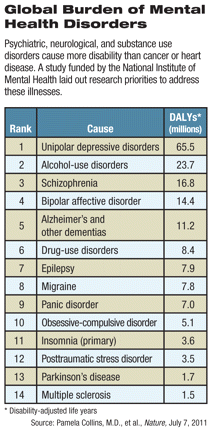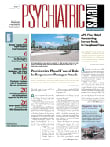The future of mental health research may be more focused over the next decade now that a group of 422 clinicians, researchers, and advocates from 60 countries has come up with 25 "grand challenges" to build a stronger foundation for advancing research in psychiatric and neurological disorders.
The project was funded by the National Institute of Mental Health (NIMH) to provide direction for "a surge in discovery and delivery science" for illnesses that now total 13 percent of the global burden of disease, more than either cancer or cardiovascular disease.
"Consortia and networks, advocacy organizations, universities, and their partners should organize their activities around one or more of these goals and the attendant grand challenges," recommended NIMH Director Thomas Insel, M.D., Pamela Collins, M.D., director of NIMH's Office of Research on Disparities and Global Mental Health, and colleagues in a report of the project in the July 7 Nature.
"There have been other studies like this but nothing on this scale that have focused on the research agenda," said Insel in an interview with Psychiatric News.
"The world is really changing," he said. "If we are interested in discovery and innovation, we'll have to reach outside our own borders."
In this case, global means going wherever the opportunities are. Thus, U.S. researchers and clinicians may have something to learn from counterparts in other countries who are already doing more with less, he said.
The panel defined a grand challenge as "a specific barrier that, if removed, would help solve an important health problem."
Of the 25 grand challenges, the five considered by the panelists to be the most significant all involve systems issues. Those challenges are to
strengthen the mental health training of all health care personnel,
integrate screening and basic mental health services into routine primary care,
improve access to effective community-based care,
make affordable medications more available, and
increase access for children in low- and middle-income countries to mental health care by trained clinicians.
The list of grand challenges also recommended expanding research to identify root causes, risks, and protective factors for psychiatric, neurological, and substance abuse disorders.
"Where there are effective treatments, they are frequently not available to those in greatest need," wrote Insel and colleagues.
"The absence of cures, and the dearth of preventive interventions for [mental health] disorders, in part reflects a limited understanding of the brain and its molecular and cellular mechanisms."
Adopting a developmental approach to solving these challenges could also guide researchers, since many mental health disorders become apparent in childhood and adolescence. A developmental view would address the special risk factors among the elderly as well.
Overall, research must provide an evidence base for all types of care and treatment interventions, whether psychosocial or pharmacological, to guide program planners, clinicians, and policymakers in their work, the report stated.
"Even incremental progress in addressing the grand challenges in global mental health could lead to significant economic and quality-of-life benefits," concluded the authors.

